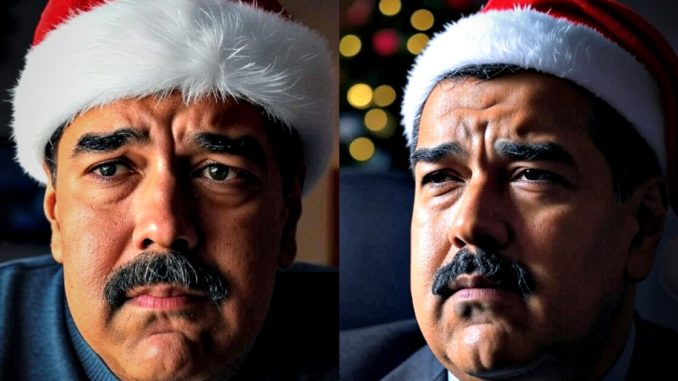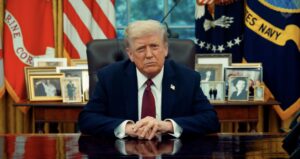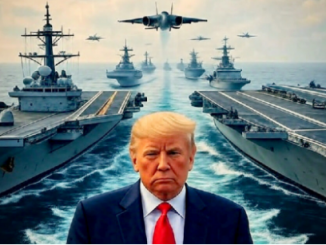
Santa Clown? Maduro in AI-Generated images by Grok.
Published September 10, 2025
A South American dictator said ‘nothing in this world will take away our right to happiness, to life, and to joy’
Venezuela Brings Christmas Forward—Again
What’s Going On?
In a surprising yet increasingly familiar move, Venezuelan President Nicolás Maduro has decreed that the Christmas season in Venezuela will officially begin on October 1st, 2025. The announcement, made during a national broadcast, was framed as a gesture to “bring joy and happiness to the people” in the face of economic hardship and foreign pressure.
This marks the fourth time during his presidency—and the second consecutive year—that Maduro has moved up Christmas celebrations. What was once a one-off morale booster has now become an annual ritual, with streets, public squares, and government offices across Venezuela set to be adorned with Christmas lights, nativity scenes, and festive music starting weeks earlier than usual.
State media quickly amplified the announcement, showcasing images of early decorations and urging citizens to embrace the holiday spirit as a symbol of unity and resilience. Officials described it as part of a broader effort to stimulate local commerce, encouraging families to spend on gifts, food, and decorations, even as most households struggle with declining wages and rampant inflation.
Critics, however, argue that the decree reflects Maduro’s reliance on political spectacle over substance. By turning a deeply cherished holiday into a government-directed event, the regime is accused of manipulating culture to mask Venezuela’s ongoing crises—hyperinflation, food shortages, power outages, and one of the largest refugee migrations in modern history.
For Maduro, though, the early arrival of Christmas is more than a cultural gesture. It’s a strategic political tool, allowing him to rally supporters, dominate headlines, and project a sense of optimism at a time when the country faces growing isolation abroad and deep discontent at home.
A Familiar Strategy
For Nicolás Maduro, moving Christmas forward is not a spontaneous decision—it has become a patterned political tactic. Since at least 2020, his government has periodically declared the early start of Christmas festivities, framing it as a gift of joy to the Venezuelan people. Each time, the decree has arrived during periods of heightened political tension or deepening economic crisis, suggesting that the holiday shift serves as more than just a cultural gesture.
Observers note that Maduro often uses early Christmas as a reset button, a way to change the national conversation. When inflation spikes, when international sanctions tighten, or when domestic opposition grows louder, the regime introduces an atmosphere of celebration—stringing up lights, sponsoring concerts, and flooding state media with images of festivity. The move projects a sense of stability and normalcy, even as daily life for millions of Venezuelans becomes more precarious.
The repetition of this strategy also shows how Maduro leans on symbolism and spectacle to maintain control. Christmas, one of the most deeply rooted cultural and religious traditions in Venezuela, carries powerful emotional weight. By associating himself with the holiday, Maduro casts himself as a fatherly figure who delivers happiness, not just hardship. This image is amplified through government-funded decorations, subsidized public events, and speeches that frame Christmas as a time of unity under his leadership.
Critics, however, argue that the tactic exposes a regime unable or unwilling to solve structural problems. Advancing Christmas does not lower food prices, stabilize wages, or restore basic services. Instead, it temporarily distracts the population, providing symbolic relief that wears off quickly once the reality of empty shelves, blackouts, and mass migration resurfaces.
In this light, Maduro’s early Christmas becomes a hallmark of his governance: ritualized distraction that substitutes spectacle for solutions, buying time while the deeper crises remain unresolved.
Political Context
Maduro’s decree to begin Christmas on October 1st cannot be viewed in isolation—it comes at a moment of intensifying geopolitical and domestic pressure. In recent months, the United States has stepped up its campaign against his government, expanding its military presence in the Caribbean and doubling the bounty for Maduro’s capture on charges of drug trafficking and corruption. Washington continues to label him a dictator, accusing his regime of undermining democracy and fueling regional instability.
At home, Maduro faces a fragile economy battered by hyperinflation, collapsing oil revenues, and international sanctions that have crippled Venezuela’s ability to trade freely. Millions of Venezuelans have fled the country in search of better opportunities, leaving behind families struggling with shortages of food, medicine, and reliable electricity. Against this backdrop, Maduro’s political standing is precarious, even among traditional supporters who have grown weary of economic decline.
By moving Christmas forward, Maduro seizes an opportunity to reframe the national conversation. Instead of allowing headlines to focus on sanctions, corruption trials, or military maneuvers in the Caribbean, the government redirects attention to a festival of lights and music. The timing casts him not as a leader under siege, but as a provider of joy and cultural stability, ensuring Venezuelans can celebrate their traditions regardless of international hostility.
The decree also serves a symbolic function on the global stage. It is Maduro’s way of signaling that Venezuela will not be cowed by external threats—that the country, under his leadership, can embrace happiness, resilience, and unity even in the face of isolation. For supporters, this defiance reinforces the image of a strong leader standing against U.S. imperialism. For critics, however, it underscores how far Maduro is willing to go in using cultural rituals as political theater, turning Christmas into a tool of statecraft rather than a sacred holiday.
What’s At Stake?
Maduro’s decision to move Christmas forward highlights more than just a quirky calendar shift—it reveals the fragile balancing act at the heart of his rule. At stake is the regime’s ability to maintain public loyalty, stimulate a broken economy, and project resilience in the face of relentless pressure.
On the economic front, early Christmas is designed to spark consumer spending, however limited. By urging families to buy gifts, food, and decorations weeks in advance, the government hopes to inject a burst of activity into retail markets. Yet the reality of collapsed purchasing power means that only a fraction of Venezuelans can participate meaningfully. For most households, celebration may mean symbolic gestures—homemade decorations or state-sponsored public events—rather than genuine prosperity. The gap between the government’s festive imagery and everyday hardship risks widening public disillusionment.
Socially, the move puts Venezuelans in a bind. For some, especially children, early festivities offer a brief escape from the grind of blackouts, empty shelves, and endless queues. For others, it feels like a forced celebration imposed from above, trivializing the suffering of millions. In this sense, what is at stake is the government’s credibility: will people embrace the spectacle, or see it as yet another hollow performance?
Politically, Maduro gambles that Christmas cheer will soften criticism and strengthen national cohesion. But the danger is that by overusing this tactic, it becomes transparent propaganda, losing its effectiveness as a distraction. Every repetition raises the question: how long can the regime rely on cultural manipulation instead of real solutions?
Internationally, the stakes are symbolic. Advancing Christmas projects Venezuela as a nation that refuses to bow to outside pressure. But critics abroad see it as confirmation that the government is out of touch with reality, prioritizing spectacle while ignoring urgent reforms. This disconnect could further isolate Maduro, hardening perceptions that his leadership survives on propaganda rather than policy.
Ultimately, what’s at stake is the very narrative of Venezuelan resilience. Is the country truly overcoming hardship with unity and joy, as Maduro claims? Or is it sinking deeper into crisis, with early Christmas serving as little more than glitter on a crumbling foundation? The answer will shape not only public perception of Maduro at home, but also how Venezuela is viewed on the world stage.
Local Reactions
Among Venezuelans, Maduro’s decree to celebrate Christmas from October 1st has drawn a mix of amusement, frustration, and quiet resignation.
On the streets of Caracas, some families welcome the decision, especially those with children who see early decorations and festivities as a rare source of joy amid daily hardship. For them, the state-sponsored concerts, public light displays, and Christmas markets—often subsidized by the government—offer a momentary escape from the grind of shortages and economic uncertainty. Parents often remark that at least their children can smile, even if the fridge remains half-empty.
But critics are far more vocal. Opposition figures accuse Maduro of trivializing religion and culture, turning one of the most sacred Christian holidays into a political stunt. They argue that Christmas is meant to be a spiritual season rooted in tradition, not a propaganda tool rolled out months ahead of schedule. Independent journalists and civil society groups point out the glaring contradiction between festive government imagery and the realities of hunger, blackouts, and hyperinflation.
Many ordinary Venezuelans express cynicism, noting that decorations and festivities do little to fix empty supermarket shelves or the rising cost of basic goods. On social media, memes mocking the decree have already gone viral, with Venezuelans joking that “soon Christmas will start in July” or that the government might as well declare “permanent Christmas” to distract people year-round.
Religious leaders have also weighed in cautiously. Some local priests and pastors acknowledge that celebrations can uplift spirits, but warn that faith should not be manipulated by politics. The early decree, they argue, risks stripping the holiday of its sacred meaning, replacing it with state-sponsored pageantry designed to bolster the regime’s image.
In the diaspora community—millions of Venezuelans scattered across Latin America and beyond—the decree is met with sadness and frustration. For many exiles, it is another reminder of the surreal disconnect between life inside Venezuela and the harsh truths that drove them to leave.
Ultimately, local reactions underscore a divided sentiment: while some cling to the joy of early festivities, the majority view it as a hollow gesture—proof of a government that prefers spectacle over solutions.
 Implications of Maduro’s “Early Christmas” Decree
Implications of Maduro’s “Early Christmas” Decree
1. Political Diversion and Propaganda
-
By shifting focus to festive celebrations, Maduro diverts public attention away from Venezuela’s severe economic crisis, food shortages, and hyperinflation.
-
It strengthens the government’s propaganda narrative—portraying Maduro as a leader who brings “joy” despite international sanctions and domestic unrest.
2. Undermining Public Trust
-
Many Venezuelans see this as manipulative theatrics, further eroding credibility in Maduro’s leadership.
-
Instead of addressing structural problems, the regime uses symbolic gestures that can increase cynicism and resentment among the population.
3. Economic Implications
-
Starting Christmas early encourages consumer spending in a collapsing economy, temporarily boosting small commerce and retail sectors.
-
However, with widespread poverty and limited purchasing power, this economic effect is likely short-lived and uneven, benefiting only select groups close to the regime.
4. Religious and Cultural Manipulation
-
By politicizing a deeply religious holiday, Maduro risks alienating Catholic and Christian communities, who may see the move as sacrilegious or disrespectful.
-
This could weaken his moral legitimacy, even among supporters who value tradition.
5. Geopolitical Messaging
-
The timing coincides with increased U.S. pressure—including military presence in the Caribbean and higher bounties on Maduro.
-
Declaring “early happiness” functions as a defiant signal to the West: portraying Venezuela as resilient and united against foreign pressure.
6. Psychological and Social Impact
-
For some, early celebrations may provide temporary morale relief, especially for children and struggling families.
-
Yet critics argue it promotes denialism, creating a surreal disconnect between festive imagery and Venezuela’s harsh daily realities (blackouts, hunger, migration).
7. Precedent for Other Authoritarian Regimes
-
This tactic could be studied or mimicked by other regimes facing domestic unrest—using cultural or religious traditions as tools of political distraction and control.
 Overall Takeaway:
Overall Takeaway:
Nicolás Maduro’s decision to advance Christmas to October 1st is less about holiday cheer and more about political survival. By staging an early season of lights, music, and festivities, his regime seeks to mask Venezuela’s grinding economic hardship, redirect public frustration, and showcase defiance against mounting international pressure.
While some families may welcome a brief reprieve from the daily struggle, most Venezuelans recognize this as a symbolic distraction, not a solution to food shortages, hyperinflation, or political isolation. The move highlights how authoritarian leaders often manipulate culture and tradition to consolidate control, even at the risk of trivializing deeply held values.
Ultimately, Maduro’s “early Christmas” reflects the paradox of Venezuela today: a government eager to project joy and stability, while its people continue to endure uncertainty, poverty, and repression. Far from uniting the nation, such decrees may deepen public distrust and underscore the regime’s reliance on spectacle over substance.
SOURCES: THE GATEWAY PUNDIT – Desperate Venezuelan Dictator Maduro Advances Christmas to October 1st for the Second Year in a Row
THE US SUN – CHRISTMAS COMES EARLY! Date of Christmas Day is moved to just THREE WEEKS away to ‘bring joy to the people’, decrees madcap dictator
THE TIMES – Christmas comes early again as Maduro decrees October start





Be the first to comment